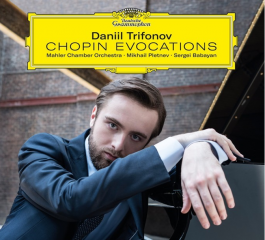Trifonov’s New Release Evokes Chopin And Beyond

Wunderkind pianist Daniil Trifonov’s latest Deutsche Grammophon album, Chopin Evocations, captures the magic of Chopin’s music and traces its influence through the works of five other composers. Released last week and available now, Chopin Evocations presents two and a half hours of music performed by today’s top young classical pianist. Trifonov, the current Gramophone Artist of the Year, offers Chopin’s two piano concertos and a selection of some of his earliest and latest solo works together with tributes to him by Grieg, Mompou, Schumann, Tchaikovsky and Barber. The double-disc set includes a collaboration with Trifonov’s fellow pianist-composer Mikhail Pletnev, who conducts the Mahler Chamber Orchestra in his freshly re-orchestrated editions of Chopin’s piano concertos.
A graduate of Moscow’s Gnessin Music School, Russia’s leading school for prodigiously talented children, Trifonovwent on to study with Sergei Babayan at the Cleveland Institute of Music. “Chopin is one of the world’s most beloved composers – the poetry of his music goes straight to the heart and requires no justification…the genius of Chopin becomes even more clear in the context of those who influenced him and those who have been inspired by him,” he says.
Chopin Evocations spans more than a century of music history, from the dreamy meditation of Chopin from Schumann’s Carnaval, to the virtuosity of Grieg’s Etude Op. 73 No. 5 (Hommage à Chopin) and Chopin’s own Rondo in C major for two pianos Op. 73, the latter recorded with Trifonov’s teacher and regular duo partner, Sergei Babayan. Trifonov chose to record the solo piano version of Chopin’s early Variations on “Là ci darem la mano” Op. 2, the work that prompted Schumann to declare, “Hats off, gentlemen! A genius!” The album closes with the celebrated Fantaisie-Impromptu Op. 66.
Trifonov’s new album features the world premiere recordings of both of Chopin’s piano concertos in Mikhail Pletnev’s orchestrations. Mikhail Pletnev addressed the notorious problems of instrumental balance and coherence in the published scores of Chopin’s piano concertos. He sought to create greater clarity and bring a chamber-like feel to their instrumentation. The results, as conveyed here by the dynamic and responsive playing of the Mahler Chamber Orchestra, are transformative. “The new orchestral transparency allows the pianist greater spontaneity and sensitive engagement with the other voices,” explains Trifonov. “The concertos are more massive in terms of length and instrumentation than anything else Chopin ever wrote. He knew and admired the piano concertos of Mozart and Beethoven, yet his interest in the form was not in the Classical balance between soloist and orchestra but in the concerto as a lyrical epic form, like a Delacroix painting, providing a huge tableau for his musical expression.”
DISC 1 Chopin, Frédéric: Piano Concerto No.2 In F Minor, Op.21/ Variations on “La ci darem la mano”, Op.2 (piano solo version)
Schumann, Robert: Chopin. Agitato No. 12 from Carnaval op. 9
Grieg, Edvard: Etude, Op. 73, No. 5, “Hommage à Chopin”
Barber, Samuel: Nocturne, Op. 33
Tchaikovsky, Peter: Un poco di Chopin
DISC 2 Chopin,Frédéric: Rondo in C major for 2 pianos, op. 73 / Piano Concerto No.1 In E Minor, Op.11
Mompou, Frederic: Variations on a Theme of Chopin. Andantino
Chopin, Frédéric: Fantaisie-Impromptu [No.4] in C-sharp minor







I apologise, but, in my opinion, you are not right. Write to me in PM, we will talk.
——
аренда катамарана на пхукете